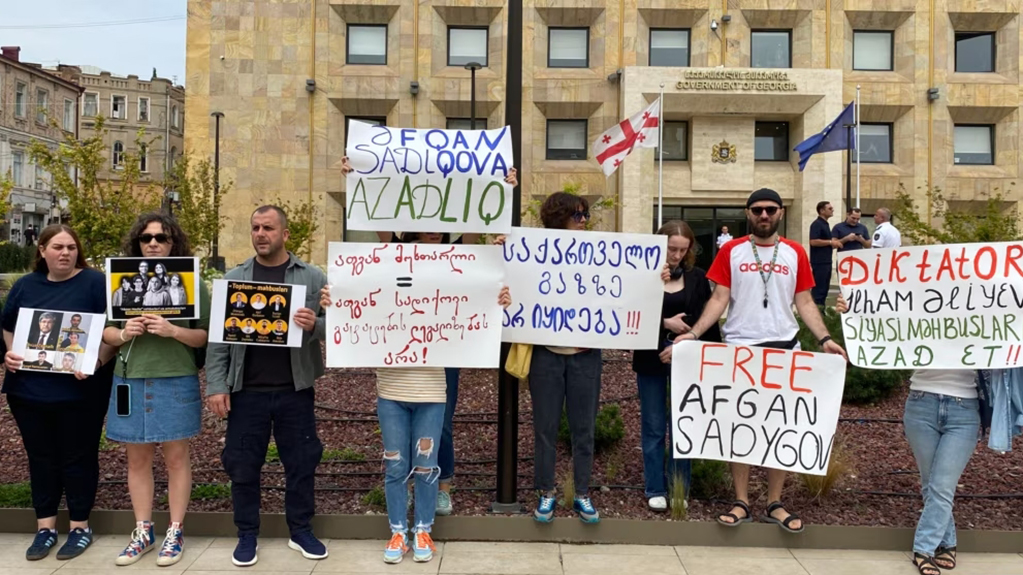Human rights defenders have appealed to the court regarding the Migration Department of the Ministry of Internal Affairs' refusal to grant international protection to Azerbaijani journalist Afgan Sadygov, who was detained in Tbilisi. The Center for Social Justice announced that, in Sadygov's case, the Georgian authorities are following the orders of Azerbaijani President Ilham Aliyev, disregarding international conclusions and violating human rights standards.
News
Lawyers Tamta Mikeladze and Keti Chutlashvili stated that the Migration Department made a decision hastily, without thoroughly reviewing the submitted documents that prove Sadygov is at real risk of political persecution, torture, or inhumane treatment in Azerbaijan.
"There are two issues that the Migration Department should consider: whether the person will be subjected to discriminatory persecution in their country of origin and, secondly, whether they will be at risk of serious harm. In Sadygov's case, both criteria were met. According to the conclusions of international organizations, he is recognized as a political prisoner and will be subject to persecution. All the evidence was presented, but the Migration Department did not take it into account," said Keti Chutlashvili.
Tamta Mikeladze cited the conclusions of the US State Department, the Ministry of Foreign Affairs of the Netherlands, and Human Rights Watch, which indicate that the journalist's detention in Azerbaijan - twice criminally and three times administratively - was politicized, fabricated, and punitive. According to Mikeladze, after his release, Afgan Sadygov continued to expose government corruption, violence, and human rights violations.
"The Azerbaijani authorities were interested in punishing and arresting him again and demanded the extradition of Sadygov, who had moved to Georgia. During his second imprisonment in Azerbaijan, Sadygov was starved for 242 days, resulting in a sharp deterioration of his health, the development of serious diseases, and a dramatic weight loss from 95 kg to 40 kg. He was confined to a wheelchair and needed several months to rehabilitate. The purpose of his arrival in Georgia was medical and psychosocial rehabilitation.
A few years ago, we had the case of Afgan Mukhtarli, when a journalist was kidnapped. Today, the authorities of Georgia are already daring to create formal procedures to "legally" hand over an honest, courageous journalist to the Azerbaijani regime.
It is doubly unacceptable for our legal system and state institutions to make such decisions, turning a blind eye to the widespread violations of rights in Azerbaijan and sacrificing the interests of human rights protection for political and business interests in Baku," said Tamta Mikeladze.
Afgan Sadygov was arrested in Tbilisi on August 3, and the next day, the court sentenced him to three months of extradition detention. After the journalist was refused asylum, he announced a hunger strike in the detention center. On the 17th day of the hunger strike, he was transferred to the prison medical facility.
Sevinch Sadygova stated that after a long hunger strike in Azerbaijan's prison, her husband developed serious chronic illnesses, and repeated hunger strikes may lead to his death. "He has been on hunger strike for 26 days, which may end in his death, and responsibility will fall on the authorities who commit illegalities in the name of the law," said Sadygova, who lives in Tbilisi with her two minor daughters. Sevinch Sadygova claims they are constantly being monitored, and she also receives threatening messages from Azerbaijan, which is why she cannot allow her children to go to school.
"The authorities of Georgia and the Ministry of Internal Affairs are personally carrying out Ilham Aliyev's orders. I don't know how to confirm this. Perhaps, if something happens to me, then society will believe," she said.
Human rights defenders are demanding the annulment of the Migration Department's decision. Additionally, they are appealing to the General Prosecutor's Office to halt the extradition process of the journalist to Azerbaijan.















